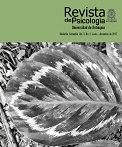Epistemological problems of contemporary psychology
DOI:
https://doi.org/10.17533/udea.rp.v9n2a12Keywords:
Episthemology, Science, Soul, PsykhéAbstract
Firstly, this paper analyzes the difficulties encountered in the attempt to carry out a reductionist analysis of the complexity of the scientific knowledge world; it is stated that for an integral consideration of contemporary scientific and technological knowledge, it is necessary an analysis that addresses its multidimensionality. Secondly, the epistemological problems of psychology are dealt in relationship with the fragmentation of the disciplinary field, with the problem of the scientificity of the discipline and with the problems related to the links between psychology and philosophy. Finally, it highlights the need to return to a meditation on the soul-psykhé if what it is meant is to contribute to a critique aimed at the constitution of psychology as a regulating technoscience of behaviors.
Downloads
References
Adorno, Th. y Horkheimer, M. (2007). Dialéctica de la ilustración. Buenos Aires: Akal.
Bachelard, G. (1981). El nuevo espíritu científico. México: Nueva Imagen.
Bernard, M. (1981). La Psicología. Madrid: Espasa Calpe.
Brunetti, J. (2010). Algunas consideraciones sobre la relación entre epistemología y psicología en Thomas Kuhn. Bajo palabra. Revista de filosofía, 419-428. DOI: https://doi.org/10.15366/bp2010.5.034
Canguilhem, G. (1958). ¿Qu'est-ce que la psychologie? Recuperado de http://psysnepap.free.fr/?p=148
Cappelletti, A. (2007). Filosofía y Psicología. El problema del sujeto. Rosario: UNR Editora.
Castoriadis, C. (2005). Figuras de lo pensable. Buenos Aires: F.C.E.
Cebrecos, F. (2014). Descartes, entre la filosofía racional y la antropología filosófica. Persona: Revista de la Facultad de Psicología, 17, 11-32. DOI: https://doi.org/10.26439/persona2014.n017.286
Cepeda, G. (2014). Psicología: la ciencia de las ciencias. Sophia: colección de filosofía de la educación, vol. 16(1), 25-45.
Cuartango, R. (1986). La conciencia y el pensamiento. En M. Cruz (Comp.) Tiempo de subjetividad (pp. 101-121). Barcelona: Paidós.
Chalmers, A. (1997). ¿Qué es esa cosa llamada ciencia? Buenos Aires: Siglo XXI.
Díaz de Kobila, E. y Cappelletti, A. (2008). Doce lecciones de Epistemología. Rosario: Laborde.
Feyerabend, P. (1998). Tratado contra el método. Madrid:Tecnos.
González Rey, F. (2009). Epistemología y Ontología: un debate necesario para la Psicología hoy. Diversitas: perspectivas en Psicología, vol. 5(2), 205-224. DOI: https://doi.org/10.15332/s1794-9998.2009.0002.01
Habermas, J. (1984). Ciencia y técnica como ideología. Madrid: Tecnos.
Hernani Pereira dos Santos, J. (2013). O cientificismo como obstáculo à compreensão ético-política da Psicologia. Psicologia; Ciência e Profissão, vol. 33(extra 0), 42-53. DOI: https://doi.org/10.1590/S1414-98932013000500006
Koyré, A. (2007). Pensar la ciencia. Barcelona: Paidós.
Kuhn, Th. (1997). La estructura de las revoluciones científicas. México: F.C.E.
Lagache, D. (1986). La unidad de la Psicología, Buenos Aires: Paidós.
Newton Smith, W. (1987). La racionalidad en la ciencia. Barcelona: Paidós.
Nudler, O. (1995). Problemas epistemológicos de la Psicología. Buenos Aires: Siglo XXI.
Palma, C. (2015). Disciplina, saber y poder: una reflexión crítica sobre la construcción de la psicología como disciplina, campo y práctica social. Teoría y crítica de la psicología, 5, 26-39.
Rivera Salazar, J. (2016). La controversia sobre la sede del alma en la antigüedad. Boletín científico sapiens research, vol, 6(2), 20-28.
Thuillier, P. (1990). De Arquímedes a Einstein. Las caras ocultas de la investigación científica. Madrid: Alianza.
Titchener, E. B. (1908). lectures on the Elementary Psychology of Feeling and Attention. New York: The Macmillan Company. DOI: https://doi.org/10.1037/10867-000
Vanzago, L. (2011). Breve historia del alma. Buenos Aires: F.C.E.
Yone Kasely, E. (2015). Una evaluación epistemológica de la psicología como ciencia. Horizonte de la ciencia, vol. 5(8), 47-54. DOI: https://doi.org/10.26490/uncp.horizonteciencia.2015.8.120
Downloads
Published
How to Cite
Issue
Section
License
Copyright (c) 2018 Revista de Psicología Universidad de Antioquia

This work is licensed under a Creative Commons Attribution-NonCommercial-ShareAlike 4.0 International License.
Texts submitted for evaluation to the Journal of Psychology of the University of Antioquia must have never been published before, nor been accepted for future publication by any other journal.
Upon the Journal’s acceptance for publication of submitted material, the author partially transfers his/her rights on the article, preserving those relative to its non-commercial use and academic circulation as a free-access file.
Except if otherwise decided, this Journal’s content is covered by a Creative Commons licence “Attribution - Non-commercial – share a like” Colombia 4.0. The licence can be checked out here.












